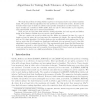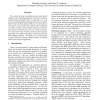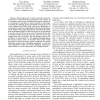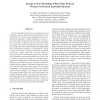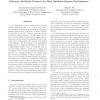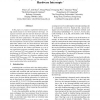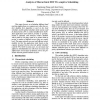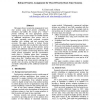RTSS
2007
IEEE
15 years 8 months ago
2007
IEEE
107
click to vote
RTSS
2007
IEEE
15 years 8 months ago
2007
IEEE
We consider the issue of deadline tardiness under global multiprocessor scheduling algorithms. We present a general tardiness-bound derivation that is applicable to a wide variety...
113
click to vote
RTSS
2007
IEEE
15 years 8 months ago
2007
IEEE
— Many applications of sensor networks require the base station to collect all the data generated by sensor nodes. As a consequence many-to-one communication pattern, referred to...
162
click to vote
RTSS
2007
IEEE
15 years 8 months ago
2007
IEEE
Recent technological advances have opened up several distributed real-time applications involving battery-driven embedded devices with local processing and wireless communication ...
146
Voted
RTSS
2007
IEEE
15 years 8 months ago
2007
IEEE
It is challenging to process transactions in a timely fashion using fresh data, e.g., current stock prices, since database workloads may considerably vary due to dynamic data/reso...
129
click to vote
RTSS
2007
IEEE
15 years 8 months ago
2007
IEEE
— We have developed an analysis-based design tool, ANDES, for modeling a wireless sensor network system and analyzing its performance before deployment. ANDES enables designers t...
RTSS
2007
IEEE
15 years 8 months ago
2007
IEEE
In this paper, we propose to implement hybrid operating systems based on two-level hardware interrupts. To separate real-time and non-real-time hardware interrupts by hardware, we...
136
Voted
RTSS
2007
IEEE
15 years 8 months ago
2007
IEEE
This paper focuses on scheduling different hard real-time applications on a uniprocessor when the earliest deadline first algorithm is used as the local scheduler, and the global ...
120
click to vote
RTSS
2007
IEEE
15 years 8 months ago
2007
IEEE
This paper focuses on priority assignment for realtime systems using fixed priority scheduling. It introduces and defines the concept of a “robust” priority ordering: the most...
126
click to vote
RTSS
2007
IEEE
15 years 8 months ago
2007
IEEE
Schedulability analysis is a cornerstone of modern real-time scheduling theory development. Utilizationbound based schedulability test is considered one of most efficient and effe...
